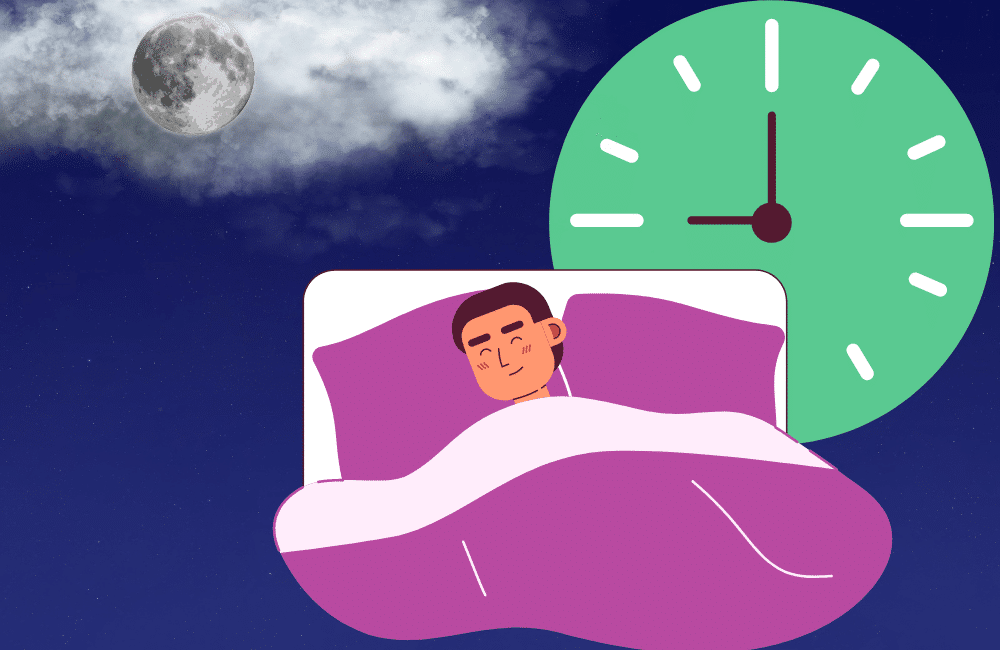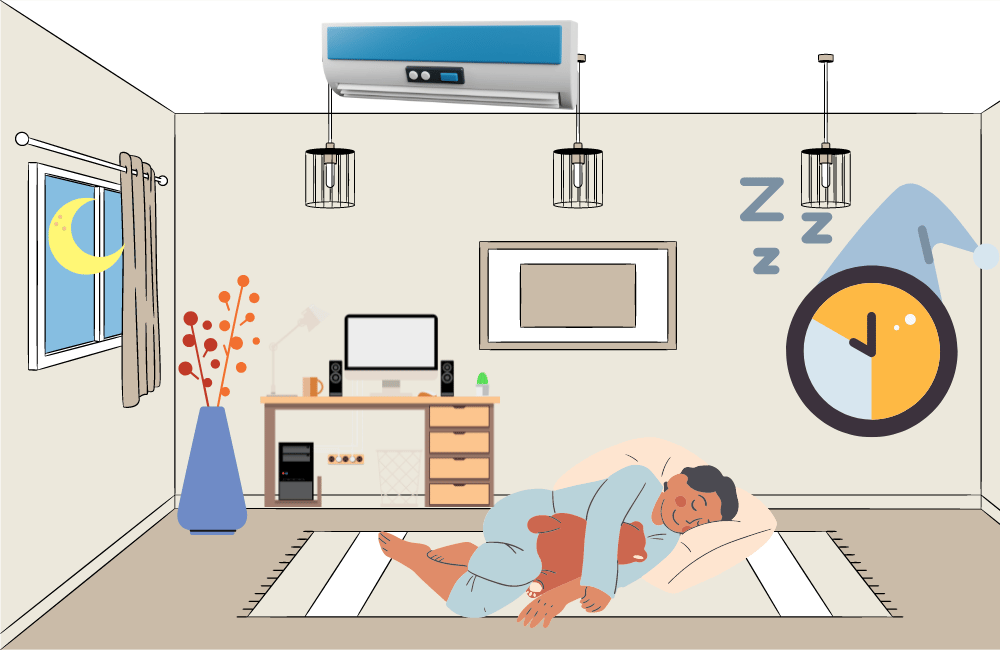Getting a good night’s sleep has become increasingly challenging in today’s fast-paced world. However, the importance of adequate sleep cannot be overstated. Quality sleep is essential for maintaining physical and mental health, promoting optimal brain function, and enhancing overall well-being.

This comprehensive guide will explore strategies and techniques to help you achieve the restful nights you deserve.
Understanding the Importance of Adequate Sleep
Getting adequate sleep is crucial for maintaining overall health and well-being. When prioritizing sufficient sleep, we unlock many benefits that positively impact our physical and mental functioning.

Benefits of Adequate Sleep
Let’s delve into the various benefits of getting enough sleep:
1. Restoring and Rejuvenating the Body
During sleep, our bodies engage in vital restorative processes that repair and rejuvenate various systems. Adequate sleep allows for the release of growth hormones, aiding tissue repair, muscle growth, and overall physical development. Additionally, sleep is essential for producing and regulating hormones that control metabolism, appetite, and immune function. By getting enough sleep, we give our bodies the opportunity to replenish energy levels and optimize its functioning.
2. Enhancing Cognitive Function and Memory
Adequate sleep plays a fundamental role in cognitive function and memory consolidation. During sleep, the brain processes and consolidates information gathered throughout the day, strengthening neural connections and enhancing memory recall. Research has shown that sufficient sleep improves attention, focus, problem-solving abilities, and overall cognitive performance. By prioritizing sleep, we optimize our brain’s capacity to learn, retain information, and perform at its best.
3. Regulating Mood and Emotions
Lack of sleep can significantly impact our mood and emotional well-being. Sleep deprivation has been linked to increased irritability, anxiety, and feelings of stress. Adequate sleep allows our brains to regulate neurotransmitters responsible for mood regulation. It promotes emotional stability, improves our ability to cope with daily challenges, and enhances overall emotional resilience. Prioritizing sleep can contribute to a more positive and balanced emotional state.
4. Boosting Immune System Function
Sleep plays a crucial role in supporting a healthy immune system. During sleep, our bodies produce and release proteins called cytokines that help combat infections, inflammation, and stress. Insufficient sleep can weaken our immune response, making us more susceptible to illnesses and infections. By prioritizing adequate sleep, we strengthen our immune system, reducing the risk of falling ill and promoting overall well-being.
5. Supporting Overall Physical Health
Adequate sleep is closely linked to overall physical health. Research has shown that individuals who consistently get enough sleep have a lower risk of developing chronic health conditions such as obesity, diabetes, cardiovascular disease, and hypertension. Sufficient sleep promotes healthy weight management, regulating hormones and controlling appetite and metabolism. It also helps maintain healthy blood pressure levels and supports cardiovascular health. By prioritizing sleep, we proactively protect and nurture our physical well-being.
Recommended Sleep Duration for Different Age Groups
Getting the appropriate amount of sleep is essential for individuals of all ages. The recommended sleep duration varies depending on age, as different developmental stages have distinct sleep needs. Let’s explore the recommended sleep duration for different age groups:

1. Newborns, Infants, and Toddlers
Due to rapid growth and development, newborns and toddlers require the most sleep. Here are the general guidelines for sleep duration in this age group:
- Newborns (0-3 months): Newborns typically need 14 to 17 hours of sleep per day, evenly distributed between daytime naps and nighttime sleep. However, their sleep patterns may be fragmented, with periods lasting a few hours.
- Infants (4-11 months): Infants require about 12 to 15 hours of sleep in a 24-hour period. They tend to establish more regular sleep patterns and may have longer periods of nighttime sleep.
- Toddlers (1-2 years): Toddlers generally need around 11 to 14 hours of sleep, including a daytime nap. Their sleep consolidates at night as they transition from two naps to one.
2. Children and Adolescents
Children and adolescents still require significant amounts of sleep to support their growth, cognitive development, and overall well-being. The recommended sleep durations for this age group are as follows:
- Preschoolers (3-5 years): Preschoolers need approximately 10 to 13 hours of sleep, including a daytime nap. Consistency in sleep routines and regular bedtimes can benefit this age group.
- School-Aged Children (6-13 years): School-aged children should aim for 9 to 11 hours of sleep per night. Establishing consistent sleep schedules and creating a relaxing bedtime routine are vital for this age group.
- Adolescents (14-17 years): Teenagers still require 8 to 10 hours of sleep per night. However, many adolescents struggle to meet this recommendation due to biological changes and lifestyle factors. Educating and encouraging healthy sleep habits in this age group is crucial.
3. Adults and Older Adults
While sleep needs may vary among adults and older adults, a general guideline for recommended sleep duration is:
- Adults (18-64 years): Most require 7 to 9 hours of sleep per night to maintain optimal health and functioning. However, individual variations exist, and some adults may find their ideal sleep duration falls outside this range.
- Older Adults (65 years and older): Older adults may experience changes in sleep patterns and often have slightly shorter sleep durations. The recommended range for older adults is 7 to 8 hours of sleep per night.
It is important to note that these recommended sleep durations serve as guidelines and individual variations and needs can exist. Pay attention to your body’s signals and adjust your sleep duration to ensure you feel well-rested and refreshed daily. Prioritizing consistent sleep schedules, creating a sleep-friendly environment, and practicing healthy sleep habits can contribute to better sleep quality and overall well-being at any age.
Creating a Sleep-Friendly Environment
Optimizing Your Bedroom
Creating a sleep-friendly environment in your bedroom can significantly enhance the quality of your sleep. Here are three key aspects to consider when optimizing your bedroom for better sleep:

1. Choosing a Comfortable Mattress and Pillows
Your choice of mattress and pillows is crucial in determining your sleep comfort. A mattress that is too firm or soft may cause discomfort and disrupt sleep. It is important to find a mattress that provides proper support for your body while also being comfortable for you personally. Consider factors such as your preferred sleeping position, any specific physical needs, and personal comfort preferences.
Similarly, pillows should be selected based on your preferred sleeping position and individual comfort needs. The right pillow should support your neck and align your spine, allowing for proper sleep posture. Experiment with different pillow materials and thicknesses to find the one that best suits your needs.
2. Controlling Noise and Light Levels
External noise and light can significantly impact your sleep quality. To create a sleep-friendly environment, consider the following:
- Noise: Use earplugs or invest in white noise machines that emit soothing sounds like rain or ocean waves to mask external noises. Alternatively, you can use a fan or play soft, calming music to create a more peaceful ambiance.
- Light: Use blackout curtains or blinds to block out external light sources that may disturb your sleep. If it’s not possible to eliminate all sources of light, consider wearing a sleep mask to create a dark environment conducive to better sleep.
3. Adjusting Room Temperature for Optimal Sleep
The temperature of your bedroom can greatly influence your sleep quality. The ideal sleep environment is cool, as a drop in core body temperature promotes sleepiness. Consider the following tips to optimize room temperature:
- Keep the room well-ventilated: Proper airflow can help maintain a comfortable temperature and prevent excessive humidity, which can disrupt sleep.
- Experiment with bedding: Choose materials that promote breathability and regulate body temperature, such as cotton or bamboo sheets and breathable blankets or comforters.
- Use a fan or air conditioner: If necessary, use a fan or air conditioner to maintain a cool and comfortable sleep environment during warmer months.
By optimizing your bedroom with a comfortable mattress and pillows, controlling noise and light levels, and adjusting the room temperature for optimal sleep, you create a sleep-friendly sanctuary that promotes restful and uninterrupted sleep. Remember, the goal is to create an environment that promotes relaxation, comfort, and a sense of calm, allowing you to drift off into a peaceful slumber.
Adopting Healthy Sleep Habits
Managing Daily Routine
Establishing a healthy daily routine is essential for promoting quality sleep. Consider the following strategies:
1. Balancing Work, Personal Life, and Sleep
Finding a balance between work, personal commitments, and sleep is crucial for maintaining a healthy lifestyle. Prioritize your sleep by setting consistent bedtimes and wake-up times, ensuring you allocate sufficient time for restorative sleep each night.
2. Importance of Physical Activity and Its Timing
Regular physical activity can contribute to better sleep. Engage in exercise or physical activity during the day, as it promotes more restful sleep. However, avoid vigorous exercise close to bedtime, as it can stimulate your body and make it difficult to unwind.
3. Avoiding Caffeine and Heavy Meals Close to Bedtime
Limit your caffeine intake, especially in the afternoon and evening. Caffeine is a stimulant that can interfere with your ability to fall asleep. Also, avoid heavy meals close to bedtime, as digestion can disrupt sleep and cause discomfort.
Managing Stress and Anxiety
Managing stress and anxiety promotes a peaceful mind and better sleep. Consider the following techniques:
- Implementing Stress Reduction Techniques
Incorporate stress reduction techniques into your daily routine, such as meditation, deep breathing exercises, or mindfulness practices. These techniques can help calm your mind, relax your body, and prepare you for a restful sleep.
- Seeking Support from Friends, Family, or Professionals
If stress and anxiety persist, don’t hesitate to seek support from friends, family, or professionals. Talking to someone can provide emotional support, helpful insights, and guidance to manage stress effectively.
- Creating a Worry-Free Mindset Before Sleep
Develop a pre-sleep routine that helps you unwind and clear your mind of worries. Engage in activities such as reading a book, taking a warm bath, or practicing relaxation exercises. This will help transition your mind from a state of alertness to a more calm and peaceful state conducive to sleep.
Improving Sleep Quality
Creating a Restful Mindset
Preparing your mind for sleep is essential to improve sleep quality. Consider the following techniques:
- Practicing Relaxation Techniques such as Meditation or Deep Breathing
Engage in relaxation exercises before bed to promote a restful mindset. Techniques like meditation, deep breathing, or progressive muscle relaxation can help release tension, reduce anxiety, and prepare your mind for sleep.
It’s a bonus time here. You can read the best sleeping meditation techniques. It will help you to get adequate sleep.
- Journaling to Clear the Mind Before Sleep
Consider keeping a journal by your bedside and writing down any thoughts, concerns, or ideas that might keep your mind active. This practice can help release thoughts from your mind, allowing you to relax and let go of racing thoughts before sleep.
- Using Aromatherapy or Soothing Scents
Explore the use of aromatherapy or soothing scents in your bedroom. Lavender, chamomile, and vanilla are known for their relaxing properties. You can use essential oils, linen sprays, or scented candles to create a calming ambiance conducive to better sleep.
Enhancing Sleep Environment
Creating a comfortable sleep environment can significantly improve sleep quality. Consider the following strategies:
- Investing in Sleep Accessories like Sleep Masks or Earplugs
If external factors such as light or noise disturb your sleep, invest in sleep accessories like sleep masks or earplugs to block out sensory disruptions and create a more tranquil sleep environment.
- Using White Noise Machines or Calming Music
If you find falling asleep in complete silence challenging, consider using white noise machines or playing calming music. These gentle background sounds can help drown out disruptive noises and promote a sense of relaxation.
- Experimenting with Different Sleep Positions for Comfort
Find the sleep position that is most comfortable for you. Experiment with different positions, such as sleeping on your back, side, or stomach, and use supportive pillows or cushions to maintain proper spinal alignment and reduce discomfort.
When to Seek Professional Help
While adopting healthy sleep habits can greatly improve sleep quality, some individuals may experience persistent sleep difficulties. Consider the following:
- Indications for Potential Sleep Disorders
It may indicate an underlying sleep disorder if you consistently struggle with falling asleep, staying asleep, or experiencing excessive daytime sleepiness. Other signs include loud snoring, gasping for air during sleep, or frequent nightmares. These symptoms warrant further evaluation.
- Importance of Consulting a Healthcare Professional
If you suspect a sleep disorder or if your sleep difficulties persist despite implementing healthy sleep habits, it is important to consult a healthcare professional. They can diagnose properly, offer treatment options, and guide you toward better sleep health.
Final Thoughts
Incorporating healthy sleep habits and creating a sleep-friendly environment are crucial steps toward achieving adequate sleep. By understanding the importance of sleep, optimizing your bedroom, adopting healthy sleep habits, and improving sleep quality, you can set the stage for restful nights and wake up refreshed and rejuvenated. Remember, quality sleep is not a luxury but necessary for a vibrant and fulfilling life. Start implementing these strategies today and prioritize sleep to reap the benefits of a well-rested mind and body.

